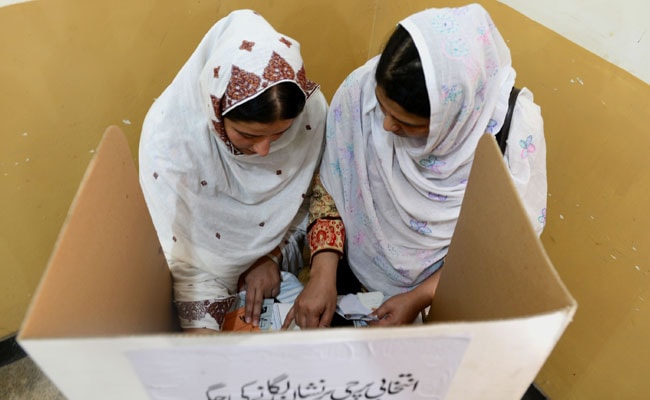
Pakistan does not have a good record of free and fair elections. (document)
Pakistan’s military doesn’t want genuinely popular civilian political leaders in power
As Pakistan prepares for general elections on February 8, the fate of the country’s democracy hangs in the balance. Concerns are growing about the fairness and transparency of the electoral process.
The nomination papers of most candidates of the Pakistan Tehreek-e-Insaf (PTI) and some other parties were rejected, triggering a debate over the legitimacy of the polls. Challenges to political stability in Pakistan are heightened by concerns about the overall fairness and legitimacy of the electoral process.
Achieving political stability is critical to addressing numerous challenges, including a weakening economy, soaring inflation and escalating foreign debt.
Pakistan does not have a good record of free and fair elections.
The country has been under direct military rule for nearly 34 years. When not in power, the military resorts to political engineering to manipulate opinion polls or dissolve governments that are not to its liking.
The military pushed PTI to power in 2018, creating leader Imran Khan with little governance experience.
Imran’s political rise and fall have been dramatic.
The PTI was virtually invisible on the political scene in 2008, but made substantial progress by gaining 17% of the popular vote in 2013 and increasing it to 32% in 2018. However, this is not necessarily the strength of the PTI’s support base as the 2018 elections were rigged in its favour.
The 2018 elections were Pakistan’s second successful democratic transition—one political party handed over power to another without being disbanded. It could herald the future of electoral democracy in Pakistan—a political system in which the military does not undermine democracy but only “guides” it.
Imran claimed that he was on the same page with the military from the beginning of his tenure. However, differences arose with the Army over the selection of the successor to the then ISI chief Lieutenant General Faiz Hameed. Chief of Army Staff General Qamar Javed Bajwa also distanced himself from Imran’s anti-American stance.
Economic mismanagement by Imran’s government is also a problem. Pakistan’s GDP dropped from $315 billion in 2018 to $292 billion in 2022.
Imran’s politics do not sit well with the military. His government was ousted in a no-confidence motion in April 2022. Imran believes that his ouster was due to a foreign conspiracy (namely the United States). He has urged his supporters to protest peacefully and has gained huge support for his anti-establishment and anti-American rhetoric.
The PTI has been a disruptive force in Pakistani politics for years. The party’s destructive politics reached its peak on May 9, 2023, marked by attacks on military installations and public property, shortly after Imran was arrested by security forces.
Since then, the military has begun to systematically disrupt and weaken Imran’s party.
Imran is currently imprisoned and attempts to marginalize the PTI have resulted in the opposition of Jahangir Tareen’s Istehkam-e-Pakistan Party and Pervez Khattak. Khattak) and other splinter parties such as PTI (Parliamentary Party).
The impartiality of Pakistan’s Election Commission has been called into question after the party was stripped of its “cricket bat” electoral symbol over unconstitutional in-party polls. Party members were intimidated and hindered in submitting nomination papers, and police targeted their families.
Judging from the way the military went after Imran and dismantled the PPP, it was clear that they would never let him return to power.
In 2018, Imran was the center of attention during the election season. Ironically, in 2024, his opponent is Nawaz Sharif of PML (N).
In the 2018 elections, the military did not want Nawaz Sharif to return to power and did everything it could to weaken the PML(N). Ironically, in 2024, it does not want Imran Khan back in power, but Sharif.
The Pakistani military does not want a truly popular civilian political leader to come to power on the back of an electoral mandate.
It also wants a civilian government that can protect the military’s core interests in decision-making.
The military is no longer willing to bear the burden of power. Instead, it prefers “guided democracy” – formal democratic structures maintained and legitimized through elections.
This veneer of democracy masks the actual role and power of the military as an institution in civil-military relations. Imran had to be abandoned because he began to undermine the arrangements with the army that brought him to power.
Now, with Imran contained and the possibility of his return to power all but non-existent, the Muslim League (NA) leadership is actively working to build a future governing coalition. However, the party lacks concrete plans to address the major challenges facing Pakistan.
The PML(N) appears to be stuck in the past, with its list of possible candidates dominated by old faces, especially those from the Sharif family.
During the tenure of Nawaz Sharif’s younger brother, Sherbaz Sharif, as prime minister, Pakistan’s pro-democracy movement performed mediocrely. This raises questions about what the PML(N) has to offer to meet Pakistan’s new economic and security challenges.
The prospects for these elections to bring political stability and address the fragile economic situation therefore remain uncertain.
Pakistan narrowly avoided default in 2023 and faces huge economic challenges. Managing debt servicing poses a significant challenge, with debt service figures expected to reach $25 billion in 2024-25 and $23 billion in 2025-26.
While external borrowing can provide temporary relief, lasting stability requires structural reforms, including fiscal responsibility and reduced reliance on external aid. It remains to be seen whether the “elected government” will have the freedom and autonomy to address these challenges, bring political stability and improve democratic governance in Pakistan.
Ajay Darshan Behera is Professor at MMAJ School of International Studies, Jamia Millia Islamia, New Delhi, India.
Originally published on creative commons go through 360 information
Follow us on Google news ,Twitter , and Join Whatsapp Group of thelocalreport.in